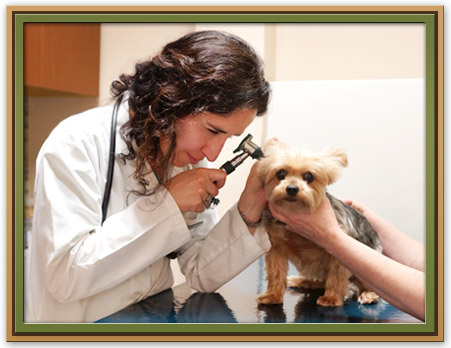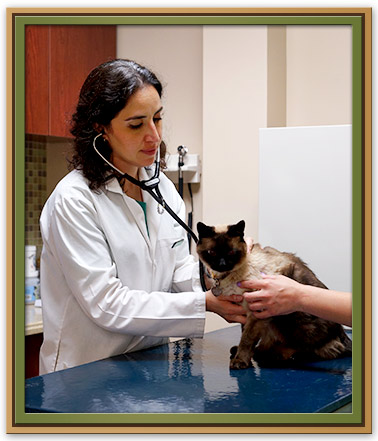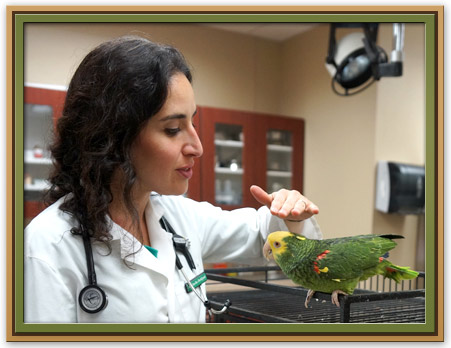Pet Wellness Services
 Wellness Care for
Wellness Care for
Every Age and Stage
Dr. Delijani and our medical staff at Green Forest Veterinary Hospital recommend regular wellness examinations for the same reason that your physician or dentist recommends them: if a health problem or issue can be detected in its early stages, there is a far greater likelihood it can be resolved and treated with less difficulty, less expense and greater success.
Regular wellness examinations are a chance for us to assess your pet's overall health, discuss any changes we see and educate and update you on advancements in veterinary care. It is also an opportunity for you to discuss your concerns or ask questions. A comprehensive physical examination also helps you make informed decisions about your special companion's overall health care.
Your Pet's Wellness Examination at Green Forest Veterinary Hospital
When you bring your pet to Green Forest Veterinary Hospital, our veterinarians work with you to create a lifetime preventive health care plan that takes into consideration your pet's age, breed, risk factors and lifestyle.
Your pet's yearly wellness examination includes our commitment to:
- Examine your pet's teeth, throat and oral cavity
- Check your pet's vision and examine the eyes
- Examine the ears for infection, ear mites, allergic reaction and other related health issues
- Examine the respiratory system
- Assess your pet's heart and evaluate cardiac function
- Test your pet's reflexes
- Palpate lymph nodes and abdomen
- Inspect the skin
- Palpate joints and muscles for arthritis and other orthopedic conditions
- Test to evaluate the function of internal organs and other systems
- Assess changes in your pet's body weight, appetite, urination
and bowel habits
- Inquire as to your pet's activity level
- Palpate the skin for unusual growth developments
- Monitor your pet's blood count
- Utilize laboratory testing to detect early signs of Lyme or Heartworm disease
- Assess and evaluate general or specific changes in your pet's health since the last wellness visit
- Discuss preventive techniques with you
- Collect and examine fecal samples for signs of parasitic infestation
- Evaluate your pet for repetitive licking or biting in one area
- Assess your pet's hair/fur and check for matting
- Demonstrate to you how to administer at-home medication
- Discuss nutrition based on life stage and body condition
Good Communication Leads to Good Health
During each examination, we take the time to listen to your concerns, answer your questions and keep you up-to-date on the information you need to be the best caregiver to your pet. Good communication between you and your pet's doctor ensures your beloved companion is receiving the care and attention it needs to live a long, happy life.
 Vaccinations for Your Pet
Vaccinations for Your Pet
Vaccinations prepare your pet for exposure to certain viruses and bacteria, so when exposed, the immune system can destroy the invaders before your pet's body becomes overwhelmed. However, not every pet requires the same series or frequency of vaccines. Our veterinarians tailor a vaccine protocol that is specific to your pet based on his or her lifestyle, risk factors and health status.
Our goal is to provide your pet with a balanced vaccination schedule that guarantees needed protection while not over-vaccinating. We rarely administer more than one vaccine at a time, and to further minimize vaccinations, we offer vaccine titers when possible. Titers are blood tests that quantify the antibodies to a particular pathogen (for example a virus such as Parvo or Distemper). This information helps to determine a pet's immune response should he/she become exposed to this pathogen, and is used to help determine whether or not a booster is required.
Although we do not adhere to a specific vaccination protocol, we generally recommend the following vaccines:
Puppies & Kittens
Core puppy vaccines: DA2PP (Distemper, Adenovirus-2, Parainfluenza and Parvovirus), Rabies
Core kitten vaccines: FVRCP (Panleukopenia Virus, Feline Calicivirus and Rhinotracheitis, also known as Herpes Virus), Rabies
Non-core puppy vaccines: Bordetella, Leptospirosis
Non-core kitten vaccines: FeLV (Feline Leukemia)
Adult Dogs & Cats
Core dog vaccines: DA2PP, Rabies (every three years)
Core cat vaccines: FVRCP, Rabies
Non-core dog vaccines: Bordetella, Leptospirosis, Lyme disease
Non-core cat vaccines: FeLV
For your pet's utmost safety, our canine rabies vaccines are thimerisol-free and the feline rabies vaccines are non-adjuvenated. Adjuvenated rabies vaccines, which include an additive to stimulate the immune system, have been linked to inflammation at the injection site and cancer. For more information on a customized vaccination protocol for your pet, please call us today for an appointment.
 Caring for Your New Puppy or Kitten
Caring for Your New Puppy or Kitten
Bringing a puppy or kitten home is a very exciting time for you and your family. Energetic and affectionate, they are a true source of joy. Our doctors and veterinary team at Green Forest Veterinary hospital shares your excitement and are here to support you with individualized puppy and kitten wellness programs and home care guidance.
The first year of care for your new puppy or kitten is the most important. Our puppy and kitten programs are designed to cover all the fundamental health care needs of your new pet during his/her early life stages. Our team of veterinarians and technicians partner with you to create a custom health plan so your new companion receives the vaccinations and examinations required to get the best start in life. Your puppy's or kitten's first year of care at Green Forest Veterinary Hospital will include:
- Physical Examinations: Your puppy's or kitten's lifetime of wellness starts with its first comprehensive nose-to-tail physical exam. Puppies and kittens should have 3-4 exams between the ages of 8-16 weeks. These visits are important because they provide our veterinarians with an opportunity to assess your pet's overall health and administer vaccines.
- Vaccinations: Due to their developing immune systems, puppies and kittens must receive a series of properly staged vaccines. Because every puppy and kitten is unique, we tailor our vaccination recommendations based on their lifestyle and/or breed and according to the suggested medical guidelines.
- Fecal exam: We recommend a minimum of two negative tests for puppies and kittens.
- Diagnostic Testing: Puppies should be tested for Heartworm and kittens tested for Feline Leukemia and FIV (Feline AIDS).
- Additional Recommendations: Your veterinarian will also discuss and recommend other services, such as parasite control, spaying, neutering and microchipping.
Do you have questions about nutrition, training, vaccinations, grooming, parasite protection, or overall health? What about tips for introducing your new pet to other pets and family members? We take plenty of time during these visits to offer health care and training advice, and discuss any concerns. This is your new kitten or puppy and we're happy to answer all your questions.
Caring for Your Senior Pet
As with humans, pets in their senior years begin to go through a gradual reduction of their physical capabilities. However, this process can be slowed and managed through proper veterinary care, thereby offering your pet an extended period of vitality and good health. Preventive care, including routine blood work and diagnostic testing, at our veterinary hospital that is tailored to your pet's age, lifestyle, and risk factors can help prevent common diseases or detect them at early and easily treatable stages.
 There is also an important role for you to play as your pet's primary caregiver. While you cannot control age-related decline, you can influence your pet's activity level, living conditions, access to quality senior veterinary care, and daily nutrition. With our help, you can manage these factors to prolong your pet's good health and well-being, even as his or her pace slows a bit.
There is also an important role for you to play as your pet's primary caregiver. While you cannot control age-related decline, you can influence your pet's activity level, living conditions, access to quality senior veterinary care, and daily nutrition. With our help, you can manage these factors to prolong your pet's good health and well-being, even as his or her pace slows a bit.
Your senior pet's wellness examination is also your chance to have us address your questions or concerns about your pet. We welcome your questions and encourage you to be involved in decisions regarding your pet's health care.
Heartworm Disease & Your Pet
Heartworm disease is a serious, life-threatening condition transmitted by mosquitoes. It affects dogs and, to a lesser extent, cats. In the U.S., Heartworm disease is most common along the Atlantic and Gulf coasts from the Gulf of Mexico to New Jersey and along the Mississippi River and its major tributaries, but it has been reported in dogs in all 50 states.
Clinical symptoms of heartworm disease develop very slowly. Early symptoms include lack of energy, exercise intolerance, coughing, and difficulty breathing. Because Heartworm disease is increasing in frequency and is a serious and deadly disease, we recommend your pet be tested annually.
Heartworm disease prevention is simple, effective and very important. For dogs, a once-a-month heartworm preventive can be given as a chewable treat. This same chewable medicine prevents not only heartworms from developing, but also kills and prevents most other types of worms that can infect your dog.
If you would like to have your pet tested for Heartworm disease, or if you would like additional information on how best to protect your pet from this dangerous parasite, please call Green Forest Veterinary Hospital today for an appointment.
In the event your pet has tested positive for Heartworm disease, we offer both conventional and alternative/holistic Heartworm treatments.
Flea & Tick Prevention
Fleas and ticks are more than a nuisance; they carry diseases dangerous to you and your pet.
Prevalent tick-borne diseases in New York include Lyme disease, Ehrlichiosis and Anaplasmosis, and they are a significant threat to you and your dog, especially during the warmer months. Ticks and tick eggs live in the grass and weeds that your dog may run through on family outings or during regular daily activities. Check and brush your dog after being outside, especially in grassy or brushy areas. If a tick is attached to your dog's skin, remove it carefully with tweezers and wash the affected bite area and your hands afterward.
 Fleas are most abundant during the warm weather; however, if left untreated, they can be a year-round problem. In fact, flea infestation is one of the most common medical problems veterinarians see, and pets suffer greatly from this condition. Your pet can be allergic to fleas, and even just one bite can result in a severely painful skin infection. Fleas can also transmit serious diseases such as bartonellosis (the bacteria that causes "cat scratch disease" in people), and other parasites like tapeworms.
Fleas are most abundant during the warm weather; however, if left untreated, they can be a year-round problem. In fact, flea infestation is one of the most common medical problems veterinarians see, and pets suffer greatly from this condition. Your pet can be allergic to fleas, and even just one bite can result in a severely painful skin infection. Fleas can also transmit serious diseases such as bartonellosis (the bacteria that causes "cat scratch disease" in people), and other parasites like tapeworms.
The best course of action to protect both your pet and yourself from fleas, ticks and the potential of tick-borne disease is prevention. There are many safe, effective flea and tick control products available at our hospital, including alternative natural repellants, and our veterinary team will help you choose the correct preventive regimen based on your pet's risk factors and health status. We also offer a Lyme disease vaccination and we recommend discussing whether it is right for your pet with one of our veterinarians.
Sarcoptic Mange
Many households dogs suffer from Sarcoptic Mange, an easily transmittable skin condition caused by near-invisible mites. Sarcoptic Mange is also commonly referred to as canine scabies, and it's a disease that's endemic to the Glen Cove area.
If your pet contracts Sarcoptic Mange, symptoms tend to appear quickly, manifesting within one week as bouts of intense itching, generally localized on the ears, elbows or legs. After itching, it is also common to observe other skin-related developments, such as scabbing, sores, or redness. Hair loss is also symptomatic of Sarcoptic Mange.
If you suspect the presence of this condition in your companion, contact Dr. Delijani and the team at Green Forest Veterinary Hospital right away. A physical exam amd skin scraping will be performed, and from there it is often possible to manage Sarcoptic Mange with medication. Results are usually seen after a month of treatment.
If you would like more information about the wellness services Green Forest Veterinary Hospital offers for your pet or to schedule an appointment, please call (516) 676-4838.